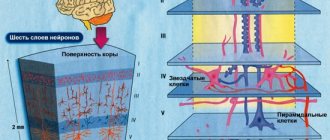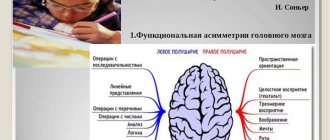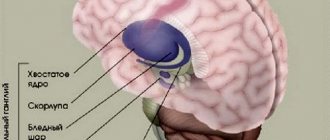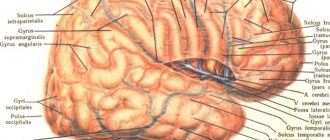The article provides recommendations on how to determine your level of mental abilities and describes the structure of mental abilities.
Speaking about mental abilities, it is worth dwelling on the definition of intelligence. In psychology, there are three different views on the definition of intelligence:
- As an analogue of learning ability, a type of knowledge acquisition (Poloni).
- As the ability to apply existing knowledge in the process of solving current life problems (Piaget).
- As the ability to adapt to new, changing living conditions (Stern).
Wexler tried to combine these complementary formulations by defining intelligence as an ability that combines rational thinking, expedient behavior and effective interaction with the world. To date, there is no consensus on the definition of intelligence in psychology.
There are several such definitions. Thus, intelligence is the name given to the most complex mental abilities of an individual. There is also such a definition: intelligence is a relatively stable structure of a person’s mental abilities, which includes all the knowledge he has acquired, all the experience, as well as the ability to further accumulate and use it in the process of mental activity. The amount of knowledge and range of interests are factors that determine a person’s intellectual qualities. In a broader sense, intelligence refers to a person’s mental abilities, the entire set of cognitive processes inherent in him in the aggregate. In a narrow sense, intelligence is thinking, mind.
It is necessary to distinguish between mental abilities and intelligence. A person’s mental abilities constitute a set of knowledge and skills that he possesses, and this also includes a set of mental actions that a person has formed throughout his life while gaining knowledge. And intelligence is everything that contributes to the successful acquisition of knowledge, skills and abilities. This is the summative result of all cognitive processes.
In psychodiagnostics, when measuring intelligence, the structure of a person’s cognitive properties is measured. This structure arises on the basis of hereditary inclinations and is formed in the process of interaction with them.
Blame others for their failures
This habit is expressive, unprofessional, and not typical of a person with a high IQ. Trying to blame other people for your failures does not characterize the smartest person. People with low IQs prefer not to be responsible for wrong decisions; it is better for them to “wallow” in self-pity or simply blame others for everything.
T. Bradberry, author of Emotional Intelligence 2.0, says: “Don't blame or shift responsibility to someone else. If you played a role—even a small one—in a particular case and something went wrong, admit it,” says Bradbury. “Once you start blaming others for your failures, others will begin to perceive you as someone who is not responsible for his actions.”
An indicator of high intelligence is the recognition that a mistake is a chance to gain new experience. J. S. Moser from the University of Michigan, in the course of his research, came to the conclusion that the brains of intelligent individuals react to mistakes and failures in different ways.
Structure of mental abilities
Many scientists tried to imagine the structure of the totality of human mental abilities; as a result, structural models of intelligence appeared by Spearman, Thurstone, Guilford, Catell, etc.
The structure of human mental abilities has been considered differently by different researchers. Thus, T. Gardner’s structure was based on the potential of the individual and consisted of a number of abilities:
- linguistic, demonstrating an understanding of the meaning of words and text, verbal fluency, and manifested in the speed of finding a word according to a given principle;
- logical-mathematical;
- spatial, allowing you to mentally model the location of an object in space and use this model;
- naturalistic;
- musical;
- bodily-kinesthetic;
- intrapersonal, involving the formation and use of the correct model of oneself.
The structure of M. M. Kholodnaya describes four main types of mental abilities:
- Convergent. They demonstrate how efficient the information processing process is, which is primarily expressed in the speed of finding the correct answer.
- Divergent, expressed in creativity, in the generation of original ideas. Originality and fluency, imaginative thinking, and sensitivity to unusual details are considered. Creative achievement requires high intelligence, but high intelligence is not an indicator of high creativity.
- Learning ability - in a broad sense, is the ability to absorb new knowledge, and in a narrow sense, the speed and magnitude of the growth rate of the effectiveness of mental activity under various educational influences.
- Cognitive styles are different ways of perceiving information, evaluating it, and structuring it into categories. For example, analytical or synthetic, reflective or impulsive.
The structure of human mental abilities in the ordinary sense is not so strict. Grouped, intellectual abilities manifest themselves in different spheres of a person’s life: educational and professional, scientific and creative. We find the manifestation of a person’s mental abilities in his social status (lifestyle and social role, education and chosen profession, level of speech proficiency).
Mental abilities are also reflected in the moral principle inherent in a person, demonstrating his ideals, his vision of good and evil, responsibility and conscience, tact and justice.
Human mental abilities are made up of many interrelated components that manifest themselves in different areas of human life.
Always prove you're right
In a controversial situation, intelligent people have a better chance of taking the place of their opponent, understanding his arguments, integrating them into their thought chains, and reconsidering current views. A clear manifestation of intelligence is the ability to look at things from a different point of view and understand them. Intelligent people are open to new information and changes in generally accepted principles.
On the contrary, people with low thinking abilities continue to argue, do not give up their position, do not understand the existing arguments, and do not notice the intelligence and competence of their opponent. This increased evaluation of oneself is called the Dunning-Kruger effect. This is a cognitive bias that causes less competent people to overestimate their own abilities while underestimating the intelligence of others.
An intelligent person also proves that he is right, but he knows how to listen, consider the available arguments, basing the final decision on them.
Myth one
The final number you get when you take an IQ test is an indicator of your intelligence and abilities.
In fact
The Eysenck test contains several sections (so-called subtests) - abstract, verbal, imaginative thinking, etc. The results of the subtests are summed up, and the average value is ultimately given. Consequently, a person who has outstanding imaginative thinking and, say, very unimportant logical thinking, the final result of the IQ test will be so-so.
React angrily and aggressively to arguments
Of course, a high level of intelligence is not determined by constant calm; even the most intelligent people get angry. But for a low IQ, aggression is literally synonymous with getting out of a situation that is not going according to their plan. When there is a feeling of lack of control of the situation according to their ideas, such people tend to use anger to prove their position.
Scientists from the University of Michigan in a study clearly showed the relationship between aggression and low IQ. In their final report, they stated: “We think that people with low IQs react aggressively from an early age. Such angry manifestations complicate the child’s mental and social development, leading to the appearance of certain disorders.”
Doesn't care about others' feelings
A reasonable person can put himself in the shoes of others, which allows him to understand their position. R. James of the University of Texas, in a study of 1,000 Americans, found that highly intelligent people often offer help without expecting anything in return. Therefore, scientists believe that the ability to take into account the needs of others makes smart people more likely to help.
“Individuals with advanced thinking abilities can understand other people’s feelings,” the study says. People with low IQ find it difficult to imagine that someone could have a different opinion, so they do not agree with him. In their minds, the idea of doing something for someone else without expecting kindness is, to say the least, strange.
Myth six
IQ is a constant value.
In fact
First, it is necessary to distinguish between real intelligence and IQ test scores. Actual abilities may vary slightly depending on your mood, well-being, and even self-esteem. As for the test problems, you should always remember: the situation in which the test taker finds himself is somewhat artificial. A person may misunderstand poorly formulated or poorly translated into Russian (there have been such cases) task conditions. He may lose interest in this activity in the middle of a test or become inattentive. And vice versa: you can train yourself to solve problems from the Eysenck test so that they will bounce off your teeth. But this will by no means indicate that his intelligence has increased unspeakably.
Consider themselves the best
Intelligent people can help others without fear of being left in the shadows. They have a healthy level of confidence and intelligence necessary to accurately assess their competence. On the contrary, people with low intelligence tend to slander others in order to present themselves in a better light. According to scientists, prejudice is not a symptom of a good IQ.
In a study conducted at Brock University in Ontario, researchers found that “people with lower IQs often demand harsher punishments, are more homophobic, and are more likely to be racist.” According to biologists, the ability to cooperate has played an important role in the overall development of mankind. This suggests that one of the most important signs of IQ is the ability to work well with others.
Surprising Signs of Intelligence
However, according to expert research, there are other interesting factors that can show your intelligence goes beyond mediocrity. Find out how to understand that you have high intelligence; see if any of the amazing scientifically proven signs of a good IQ apply to you.
You are the firstborn
If you are the oldest child, congratulate yourself. A new study from the University of Edinburgh has found that first-born children score higher in IQ than their younger siblings. What connection could there be between first-born children and exceptional mental abilities?
Experts followed 5,000 children from birth to age 14, and assessed how the children read, write, and solve word problems and math problems every two years. Scientists have found that, despite the same emotional support provided to children by their parents, first-born children receive more tasks that help improve their thinking.
you are swearing
Most people associate swearing with a lack of mental ability and education, but, surprisingly, harsh language can sometimes indicate high intelligence. Scientists from Marist College in New York have emphasized the connection between "strong words" and IQ.
They asked volunteers to say (orally or in writing) as many words as possible from different categories, such as obscenities, animals, words starting with a certain letter. After evaluating the results, the experts learned that people who managed to write the most everyday concepts included more swear words in their lists.
Experts explain this in such a way that obscene words expand the vocabulary, and the correct use of a wide range of words is a sign of increased intellectual abilities.
Do you have the concept of black humor
The next sign of high intelligence in adolescents (usually 16-17 years old) and adults is the concept of black humor. A slightly distorted sense of humor, which not everyone understands, according to Austrian scientists in the field of psychology, indicates high intelligence. They asked more than 150 people to rate cartoons that included dark humor. Then they measured their verbal and nonverbal intelligence, mood swings, and aggressiveness. Participants who preferred the most vulgar jokes had higher levels of both types of intelligence and were less aggressive than people who preferred traditional forms of humor.
According to scientists, the reason is that the concept of a vulgar joke requires the use of all mental power, which not everyone can do. Dark humor is much more complex than a typical joke, so it requires good thinking skills to appreciate it.
Your mother suffered from nausea during pregnancy
Unpleasant nausea during pregnancy affects almost all expectant mothers, but its intensity may be an indicator of the intelligence of their children. Researchers from Toronto, Canada, studied expectant mothers during pregnancy and then their children after birth.
Experts found that the children of women who suffered the most from morning sickness during pregnancy later scored higher on IQ tests than the children of mothers who did not spend every morning cuddling the toilet.
Scientists have linked this phenomenon to maternal hormone levels, estradiol and prolactin. Women with morning sickness expose their babies to higher levels of these hormones, which can lead to increased fetal brain development.
You are an owl
Is the rhythm of an owl characteristic of you? In this case, according to a British study, you are smarter than people who prefer to live in accordance with the opposite rhythm (larks). During an 8-year study, experts observed 20,000 teenagers and came to interesting conclusions.
People who go to bed later than their peers are more intelligent and have higher IQs. Scientists believe that individuals with advanced mental abilities were able to change their natural circadian rhythm (more commonly known as the internal clock), causing them to go to bed earlier.
Our ancestors instinctively slept at night to avoid nocturnal predators, but smart, modern humans evolved on these risks, adapting to the night hours, which our ancestors could not do.
In order to increase IQ, you should not change your circadian rhythm. Enough training of the brain, memory, attention. Also, remember that most healthy people need at least 7-8 hours of sleep.
You are an introvert
You don't like the big city, you don't like going to parties, you feel uncomfortable in a crowded bar? These signs, characteristic of introverts, indicate increased intelligence. A British study that assessed 15,000 adults found that those with a high IQ score were less satisfied living in a densely populated area.
In addition, these people reported greater life satisfaction when spending less time socializing with friends than people with lower intelligence levels. Introverted thinking evolved along with evolution—our ancestors lived in tribes, and socialization was often necessary for survival, the researchers explained. But smart people probably went beyond "tribal support." This means that they can adapt to today's fast-paced society, regardless of their peers.
Your desk is a mess
Good news for clutter lovers. If you have a lot of different things on your desk that don't always have a use, you may be smarter than others. A chaotic environment, according to research from the University of Minnesota, supports creative thinking.
How to find out your IQ
To determine the IQ value, special tests were developed. There are two types:
- for children 10-12 years old;
- for children over 12 years old and adults.
The measurement technique is the same for all options, only the level of difficulty of the questions changes. Each test has a certain number of questions and a limited time to complete them.
They are designed so that the results, which are described by a probability distribution, show an average IQ of 100. The values are grouped according to the following scheme:
- the coefficient of 50% of all people is in the range of 90-110;
- the remaining 50% of people are divided equally between those with a score below 90 and those with a score above 110.
What IQ level corresponds to mild mental retardation? If its indicator is below 70.
The tasks in the tests are varied, the complexity of each subsequent task increases. There are problems for logical and spatial thinking, knowledge of mathematics, attentiveness, and the ability to find a pattern. Naturally, the more correct answers a person gives, the higher the assessment of his level of intelligence will be.
The tests are designed for different age groups, so the indicators of a teacher and a 12-year-old student can be the same, because the development of each of them will correspond to his age.
Today on the Internet you can find a huge number of different tests that offer to find out your level of knowledge and intelligence. But most of them were not developed by professionals, so they are unlikely to show reliable results.
To find out your level of intelligence you need to use professional tests, such as:
- Kettler;
- Amthauer;
- Eysenck;
- Ravena;
- Wexler.











